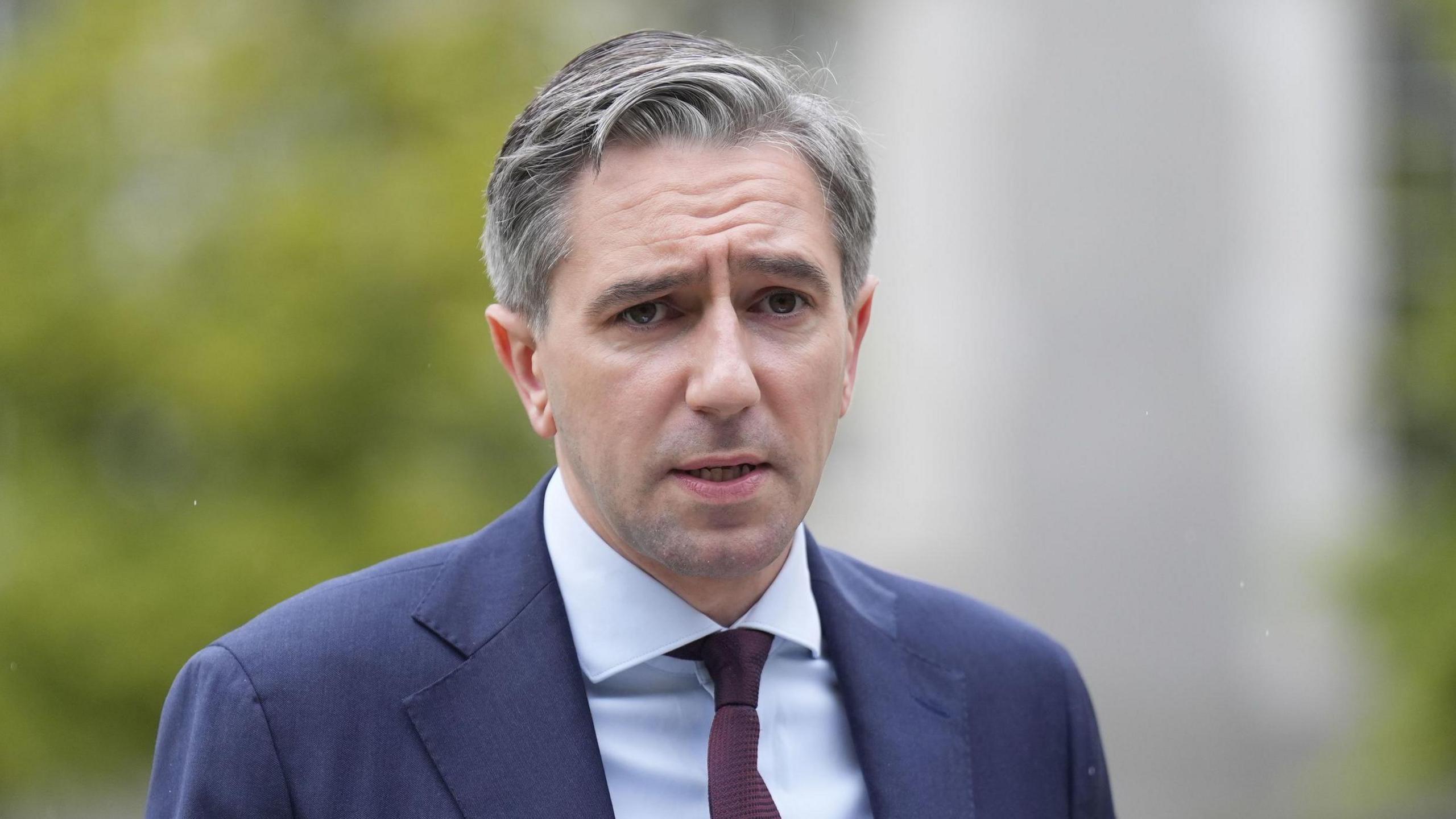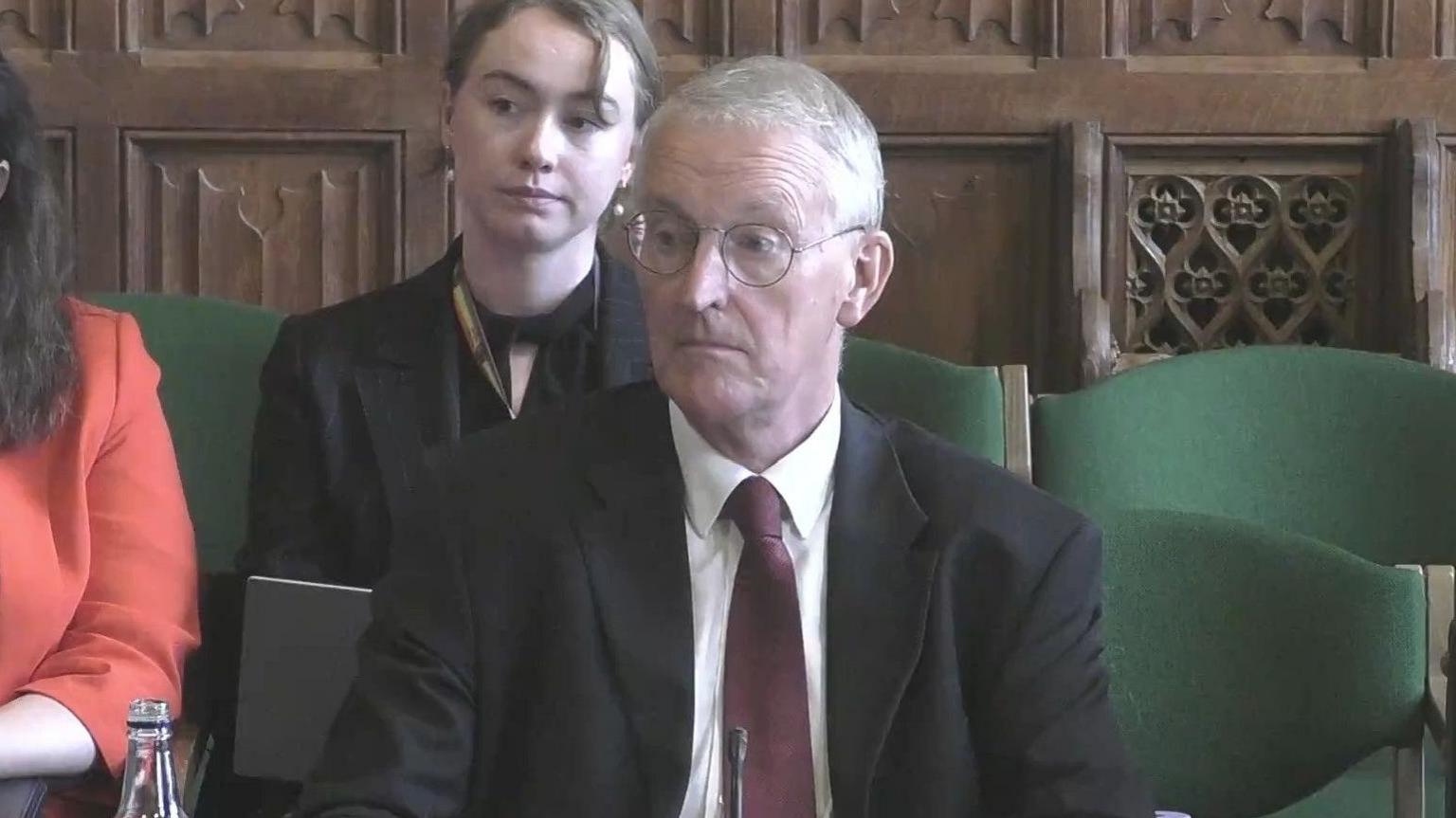Irish government confirms new Troubles legacy agreement is close

Tánaiste Simon Harris was speaking at the British-Irish Association (BIA) conference in Oxford
- Published
An agreement between the UK and Irish governments on dealing with the legacy of the Northern Ireland Troubles is "effectively there", the Tánaiste has said.
Speaking after the British-Irish Association (BIA) conference in Oxford, Simon Harris said the UK and Ireland were "on the verge" of developing a framework compliant with the European Convention of Human Rights (ECHR).
It comes just days after the Northern Ireland Secretary Hilary Benn, said the UK government is "close" to a new agreement on dealing with legacy cases.
The Irish government, along with all of Northern Ireland's political parties and victims' groups, oppose the existing UK Legacy Act.
Unionists have previously reacted negatively towards the UK government dealing with Dublin on the controversial Legacy Act and the Independent Commission for Reconciliation and Information Recovery (ICRIR).
While the Labour Government has committed to repealing parts of the Act, which has faced opposition from political parties in Northern Ireland and victims' organisations, it has decided to keep and reform the commission.
Unionist politicians have been critical of any move to allow the Irish Government to have influence over the ICRIR stating that Dublin has not done enough to address legacy itself.
The Tánaiste told conference attendees that this new collaboration between the two governments will be meaningful, only if it includes and delivers for the people of Northern Ireland.
Harris said Northern Ireland Secretary Hilary Benn had been an "honourable interlocutor" in the negotiations, adding: "We're effectively there in relation to a deal on legacy."
The Tánaiste stressed the importance of how any new agreement "lands" with people in Northern Ireland, adding: "Trust is not like a light switch, it's not something that can just be turned on or off - it has to be earned."
Speaking after delivering his speech he added: "And people's trust in the North - people's trust across the island - in legacy mechanisms is pretty well shook because of the actions of previous governments, nothing to do with the current British Government."

Hilary Benn appeared before a sitting of the Northern Ireland Affairs Committee on Wednesday
Having appeared before the Northern Ireland Affairs Committee, external on Wednesday, NI Secretary Hilary Benn did not indicate when a deal might be announced.
He repeated the ICRIR would remain, but would be substantially reformed.
That will include setting up an oversight board, the power to hold some hearings in public and introducing clearer rules around managing conflicts of interest.
The DUP leader Gavin Robinson has been critical of Dublin's approach to legacy issues.
Robinson said the Irish government's "utterly inadequate" memorandum of understanding on the Omagh bomb reflects "its approach to uncovering the truth of the past".
Similarly the TUV have indicated objections to any involvement from the Irish government.
Party leader Jim Allister claimed Benn's "approach and interest is singularly focused on placating Dublin".
Allister also criticised the secretary of state for not "meeting the needs of the innocent victims of the IRA".
In response to this criticism Harris claimed the Irish Government will do "more" to address legacy in its jurisdiction.
What is the Northern Ireland Troubles (Legacy and Reconciliation) Act?
The act was passed by the Conservative government in September 2023 despite opposition from Labour, all Northern Ireland parties, several victims' groups and the Irish government.
It created a new legacy body known ICRIR to take over all Troubles-era cases from 1 May 2024, including those on the desk of the Police Service of Northern Ireland.
The act shut down all historical inquests.
The act's most controversial element, the offer of conditional immunity to suspects, was disapplied following legal action by bereaved families.

More than 3,500 people lost their lives during the 30-year conflict in Northern Ireland
The court ruled this part of the act was incompatible with human rights' legislation and the Windsor Framework.
Last summer, the Labour government wrote to the Belfast courts abandoning an appeal against the striking out of the amnesty clause in the legislation.
In December, the secretary of state formally started the process to repeal the act, but as well as prompting a backlash from veterans who do not want to see the law repealed, he was criticised by some political parties and victims' groups for not moving quickly enough.